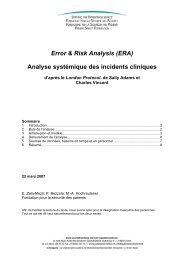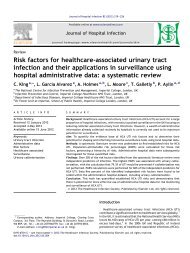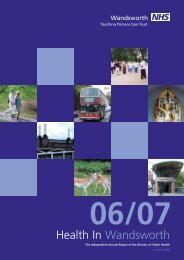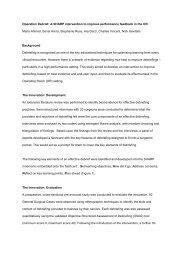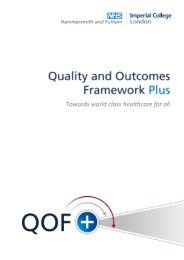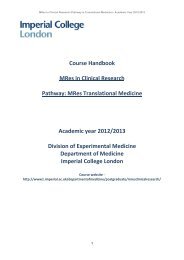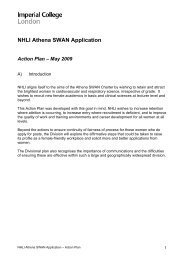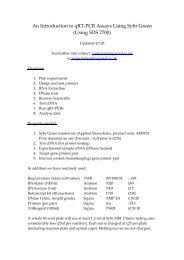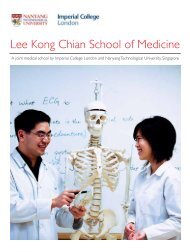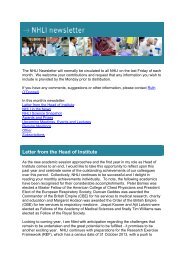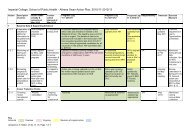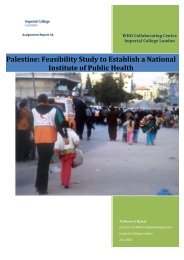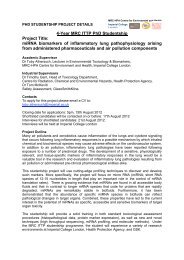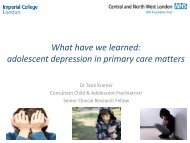2009 Annual Report - Imperial College Faculty of Medicine ...
2009 Annual Report - Imperial College Faculty of Medicine ...
2009 Annual Report - Imperial College Faculty of Medicine ...
- No tags were found...
Create successful ePaper yourself
Turn your PDF publications into a flip-book with our unique Google optimized e-Paper software.
WHO Collaborating CentrePublic Health Education and TrainingWHO Collaborating Centre2008 - <strong>2009</strong> <strong>Annual</strong> <strong>Report</strong>Department <strong>of</strong> Primary Care & Public HealthSchool <strong>of</strong> Public Health<strong>Imperial</strong> <strong>College</strong> LondonLondon, United KingdomDirector: Pr<strong>of</strong>essor Salman Rawaf MD PhD FRCP FFPHWHO CC ICL UK ANNUAL REPORT 2008 | 09 1
Title <strong>of</strong> Collaborating Centre:WHO Collaborating Centre for Public Health Education and TrainingInstitution name:<strong>Imperial</strong> <strong>College</strong> LondonCity and country <strong>of</strong> location:London, United KingdomWHO CC ICL UK ANNUAL REPORT 2008 | 09 2
Pr<strong>of</strong>essor Salman RawafMD PhD DPH MPH MCH DCH FRCP FFPH MFPHMIs.rawaf@imperial.ac.ukSalman Rawaf qualified in medicine with subsequent training in paediatrics and public health.Pr<strong>of</strong>essor Rawaf is Director <strong>of</strong> the WHO Collaborating Centre for Public Health Education andTraining which supports several WHO Regions and their Member States. He has published morethan 80 scientific papers, 2 books and many international reports. He is the Founder and Editor-in-Chief <strong>of</strong> the journal Public Health <strong>Medicine</strong> and a member <strong>of</strong> a number <strong>of</strong> editorial boards. He iswell known for his international work and his contribution to global health. He is an adviser to theWHO on primary care, public health, health system and medical education.Pr<strong>of</strong>essor Rawaf is a Fellow <strong>of</strong> the Royal <strong>College</strong>s <strong>of</strong> Physicians London and the UK <strong>Faculty</strong> <strong>of</strong>Public Health and Member <strong>of</strong> the <strong>Faculty</strong> <strong>of</strong> Public Health <strong>Medicine</strong> Ireland. He is the Chair <strong>of</strong> theInternational Committee, <strong>Faculty</strong> <strong>of</strong> Public Health UK, Executive Member <strong>of</strong> the InternationalCommittee <strong>of</strong> the Academy <strong>of</strong> the Royal Medical <strong>College</strong>s, Council Member <strong>of</strong> Chelsea andWestminster Hospital Foundation Trust, Member <strong>of</strong> WHO Advisory Committee for Health research,and Programme Leader <strong>of</strong> the Postgraduate Diploma/MSc in Family <strong>Medicine</strong> MiddlesexUniversity. He is a guest lecturer at Ghent University, Belgium. His contributions to public healthand primary care in research and service delivery are well documented. Among the manyinnovative approaches is Staying Healthy: a programme to assess risk factors for chronic diseasesin community settings and enable individuals to engage in their own health.Elizabeth A. DuboisBSc BA (Hon) MSc FRSPHe.dubois@imperial.ac.ukElizabeth Dubois is Deputy Director <strong>of</strong> the WHO Collaborating Centre. She graduated withhonours in economics from the American University <strong>of</strong> Paris and a Master’s degree from theLondon School <strong>of</strong> Economics. She trained as a registered nurse gaining clinical experience inpaediatric oncology, bone marrow transplant, cardiology and diabetes.From 2002-2005, during non-peace times, she worked at the Ministry <strong>of</strong> Health in Bahrain andbegan her international commitment to the WHO. Returning to Europe, Elizabeth’s researchinterests extend to health policy, public health, patient safety, prevention, primary care andeffectiveness, particularly in relation to health services. In 2006 she was appointed AssociateDirector <strong>of</strong> Public Health in South West London Primary Care Trust and in the same year launchedan academic exchange programme with Austria’s Carinthia University <strong>of</strong> Applied Science.WHO CC ICL UK ANNUAL REPORT 2008 | 09 3
Through Elizabeth’s work with the WHO she is also contributing to global efforts to promote publichealth education. She has published articles on public health, nursing, international development,economics and is a guest lecturer. She is a Fellow <strong>of</strong> the Royal Society for Public Health (UK),member <strong>of</strong> the Economics Honour Society, International Health Economics Association and theInternational Union for Health Promotion and Education.Ela AugustyniakMAe.augustyniak@imperial.ac.ukEla Augustyniak is Administrator <strong>of</strong> the WHO Collaborating Centre. She graduated in AppliedLinguistics from Warsaw University. She gained valuable experience in education as a teacher andcourse organiser. In her work for educational institutions she was involved in the production <strong>of</strong>training materials, design <strong>of</strong> curricula and development <strong>of</strong> international cooperation.Contact:WHO Collaborating Centre for Public Health Education & TrainingDepartment <strong>of</strong> Primary Care & Public HealthSchool <strong>of</strong> Public Health<strong>Imperial</strong> <strong>College</strong> LondonCharing Cross Campus3 rd Floor, The Reynolds BuildingSt Dunstan’s RoadLondon W6 8RPUKTel: 0044 (0) 20 7594 8603 / 8814Fax: 0044 (0) 20 7594 0847IM Address: http://www1.imperial.ac.uk/medicine/about/divisions/publichealth/pcsm/whocollaboratingcentre/WHO CC ICL UK ANNUAL REPORT 2008 | 09 4
TABLE OF CONTENTS1. INTRODUCTION2. TERMS OF REFERENCE (TOR)3. WORK PERFORMED IN RELATION TO TERMS OF REFERENCE4. COLLABORATION BETWEEN THE CENTRE & WHOVisits by WHO staff to the Centre (HQ and/or Regional Office)Visits by the Centre to WHO HQ, Regional Offices or FunctionsOther collaborations5. OTHER EDUCATION & TRAINING ACTIVITIES6. WHO SUPPORT TO THE CENTRETechnical Services AgreementFinancialOther7. RECOMMENDATIONS8. PUBLICATIONS/PRESENTATIONSWHO CC ICL UK ANNUAL REPORT 2008 | 09 5
1. INTRODUCTIONThe WHO Collaborating Centre for Public Health Education and Training wasdesignated in June 2007. Supported by the British Government, the CollaboratingCentre sits within the Department <strong>of</strong> Primary Care & Public Health (School <strong>of</strong> PublicHealth) at <strong>Imperial</strong> <strong>College</strong> London. The currentsecond report shows an increase in both number andscope <strong>of</strong> activities that the Centre has implementedduring the period between June 2008 and May <strong>2009</strong>.The Centre is currently involved in several publichealth training and educational activities in Englandand internationally in all six WHO Regions (see figureFig. 1). The Centre’s work focuses on health ascomplete physical, mental and social well-being; notmerely the absence <strong>of</strong> disease.Over the last five years (pre and post-designationperiod) the Centre endeavoured to support WHO workwith a focus on promoting public health principles,enhancing the role <strong>of</strong> primary health care,strengthening human resource capacity, addressingthe escalating problem worldwide <strong>of</strong> noncommunicabledisease, assessing the impact <strong>of</strong> technology and finally preparing andsupporting countries in national health systems strengthening and management.Teaching methods at the Centre include didactic and interactive learning and aredesigned to be highly participatory drawing on the international pr<strong>of</strong>iles <strong>of</strong> theparticipants. Training programmes focus on health service planning, understandinghealth needs and health impact assessments, strengthening human resourcedevelopment, health financing, principles <strong>of</strong> health prevention, leadership skilling andbetter health systems management.WHO CC ICL UK ANNUAL REPORT 2008 | 09 6
The Centre also provides an extensive programme <strong>of</strong> consultancies at an internationallevel supporting countries in health system reform, modernisation, financing andcapacity development. The nature <strong>of</strong> this vital work is to enable countries to meet thehealth challenges <strong>of</strong> the 21st Century while securing the health <strong>of</strong> the whole populationand ensuring fairness in service delivery and use <strong>of</strong> resources. The Centre’s innovativeapproach has been instrumental inensuring better and sustainable healthfor many countries around the world.The Centre continues to expand andhas been increasingly active instrengthening primary care and publichealth in lower and middle-incomecountries. Through workshops,collaborations, conference papers,academic exchanges and networking,the Centre’s publications have beenvaried and prolific. Research hascontinued in human resource development with a focus on public health education andtraining including support in establishing schools <strong>of</strong> public health and strengthening <strong>of</strong>public health elements in medical and health-related educational programmes.Consultancy work has focused on developing anddisseminating good public health and primary healthcare practice including general family practice.In October 2008, the Centre relocated from SouthWest London to <strong>Imperial</strong> <strong>College</strong>, Charing CrossCampus. Now in the heart <strong>of</strong> Central London, theCentre, with its strong links to the Department <strong>of</strong>Primary Care and Public Health as part <strong>of</strong> the School<strong>of</strong> Public Health has created a magnificent opportunityfor WHO Fellows to access, explore and benefit fromone <strong>of</strong> the world’s leading research and medicalfacilities. <strong>Imperial</strong> <strong>College</strong> London, with a reputationOur innovativeapproach has beeninstrumental inensuring betterhealth for all in manycountries around theworldfor excellence in teaching and research, attracts students and staff <strong>of</strong> the highestinternational quality and is repeatedly ranked among the world’s top 10 universities.This development leads the Centre towards playing a stronger role in executing itsobjectives in more countries around the world and prepares the ground for the Centre’sapplication for re-designation in June 2011.WHO CC ICL UK ANNUAL REPORT 2008 | 09 7
2. PROFESSIONAL TERMS OF REFERENCE (TOR)Since its inception in June 2007, the Centre collaborates with the WHO according tothe following terms <strong>of</strong> reference:1) Collaborate in the development <strong>of</strong> a pedagogical framework and strategy, tosystemize and operationalise public health training and education (built onevidence-based human resource development).2) Co-develop and share training, educational tools and standards in areas <strong>of</strong>public health practice (epidemiological and economic healthcare needsassessment, impact assessment, health planning, evaluation, clinicalgovernance, communication skills, participatory needs assessment, communitydevelopment, etc).3) Provide evaluation <strong>of</strong> public health projects and disseminate good practice thathas a sustaining impact on population and individual health.4) Strengthen the concept <strong>of</strong> health service utilization with regard to limitedresources through the use <strong>of</strong> economic analysis and evaluation, asdemonstrated by examples <strong>of</strong> efficient allocation <strong>of</strong> resources for healthservices in the UK and Europe.5) Support WHO efforts to upgrade and strengthen public health nationalcapabilities in the Member States, adopting best practice approaches.6) Facilitate pr<strong>of</strong>essional exchange programmes, and create training opportunitiesin research, Continuing Pr<strong>of</strong>essional Development and “Training the Trainers”programmes.7) Provide logistical, technical, administrative support and co-organize WHOpublic health workshops, visits, and fellowships.WHO CC ICL UK ANNUAL REPORT 2008 | 09 8
WHO Collaborating Centre ActivitiesAs illustrated the Centre’s activities extend to several WHO Regions and their MemberStates and includes the WHO Headquarters in Geneva.Figure 1: Activities per Regions and HQ (excluding UK)2008-<strong>2009</strong>Activities per Regions and HQ(excluding UK)AFROEMROEUROHQPAHOSEAROWPROFigure 2: Activities per Regions and HQ (including UK)Figure 3: Activities per Terms <strong>of</strong> ReferenceActivities per Terms <strong>of</strong> ReferenceTOR 1TOR 2TOR 3TOR 4TOR 5TOR6TOR 7WHO CC ICL UK ANNUAL REPORT 2008 | 09 9
3. WORK PERFORMED IN RELATION TO THE TERMSOF REFERENCE3.1. TOR #1: Collaborate in the development <strong>of</strong> a pedagogical framework andstrategy, to systemize and operationalise public health training and education(built on evidence-based human resource development).3.1.1. Family <strong>Medicine</strong> Postgraduate Diploma (Jointly with Middlesex University)(Ongoing through 2008-<strong>2009</strong>, London)Our WHO Collaborating Centre, along with Rila Publications Ltd and MiddlesexUniversity, has successfully developed a unique and effective resource <strong>of</strong> interactivetraining for family medicine. The one-year programme,based on the new UK’s Royal <strong>College</strong> <strong>of</strong> GeneralPractitioners (RCGP) curriculum (as approved byPostgraduate Medical Education and Training Board(PMETB) includes on-the-job structured residenttraining. Aligned with current best practice, it aims todevelop and strengthen pr<strong>of</strong>essional skills in primarycare (and public health) with regard to research andevidence-based practice. An on-line component meanscourses are delivered worldwide. Fully accredited by theRCGP, the programme maintains a strong local and UKmentoring element and issues a postgraduate diplomaupon completion. Coursework is based on specialist projects and focuses on researchskills. The programme itself provides collaborative academic and clinical support andincludes virtual, on-line learning. The program is already active in the UK, India andadvance negotiations for launching the programme in Oman, Sudan, the Seychellesand other countries.3.1.2. Carinthia University <strong>of</strong> Applied Sciences(Ongoing through 2008-<strong>2009</strong>, London)For several years the WHO CC has been the host tostudents from Austria’s Carinthia University <strong>of</strong>Applied Sciences for local work placements in publichealth. Through practical experiences, the academicexchange programme aims to strengthen skills andenhance the understanding <strong>of</strong> the roles andresponsibilities <strong>of</strong> a public health practitioner.Students visit community projects across the Centre’sarea <strong>of</strong> practice which focuses on health promotion,health protection and/or health prevention. Workplacements, or internships, include data collectionand analysis. Students are responsible for presenting their findings and the impact <strong>of</strong>population-based health care in our local health economy.Led by the Centre’s Deputy Director, Elizabeth Dubois the Centre’s involvement in theprogramme is particularly rewarding as it collaborates with Europe to provide practicalWHO CC ICL UK ANNUAL REPORT 2008 | 09 10
learning opportunities to students while helping them develop awareness and the value<strong>of</strong> public health.3.1.3. National Centre <strong>of</strong> Excellence for Health Promotion(31 May – 04 June 2008, Jeddah, Saudi Arabia)The WHO CC, working with the University <strong>of</strong> Arizona (USA), Thomas JeffersonUniversity (USA), Executive Board <strong>of</strong> The HealthMinisters’ Council for Gulf Cooperation Council (GCC)States and the Saudi Society <strong>of</strong> Health Promotiondeveloped a full proposal for the Saudi National Centreto conduct research and training courses. The NationalCentre will act as a focal point and resource <strong>of</strong>excellence and high practice standards in healthpromotion for the countries <strong>of</strong> the GCC in particular andthe region.3.1.4. Collaboration on Non-Communicable Disease Framework(01-03 June <strong>2009</strong>)In collaboration with Department <strong>of</strong> Health UK and WHO HQ Geneva, £80,000 wassecured to run workshops in London on Non-communicable Disease (NCD) policy andstrategy. Theses workshops are designed to introduce to high level policy makers inmiddle and low income countries [MLIC] how to integrate the art <strong>of</strong> prevention, controland management <strong>of</strong> NCD into their health systems strategies and, in particular,primary health care development. From this generous funding two-week trainingworkshops will be launched in 2010.Additional workshops will be targeted for the GCC Countries. While unhealthy lifestylesare contributing to the huge burden <strong>of</strong> non-communicable disease in every country, inthe EMRO Region it is expected that NCD will constitute more than 60% <strong>of</strong> diseaseburden by the end <strong>of</strong> 2010. Funded by the State <strong>of</strong> Kuwait, on the current status <strong>of</strong>strategy implementation for the control and prevention <strong>of</strong> NCD in this region,workshops will be held in May 2010 and are a follow-up to the 2007 workshop initiatedand conducted by the WHO Centre, as reported in WHO CC <strong>Annual</strong> <strong>Report</strong> 2007-2008.3.2. TOR #2: Co-develop and share training, educational tools and standards inareas <strong>of</strong> public health practice (epidemiological and economic healthcare needsassessment, impact assessment, health planning, evaluation, clinicalgovernance, communication skills, participatory needs assessment, communitydevelopment, etc).3.2.1. Supporting Public Health Leadership in the Caribbean(8-9 th December 2008, Jamaica)WHO Centre Direct, Pr<strong>of</strong>essor Rawaf and Chris Brook from the Department <strong>of</strong> Health UKvisited the University <strong>of</strong> West Indies. Discussions were held with the Jamaican ChiefMedical Officer and PAHO in an effort to initiate the public health leadership programme.Best practices as well as challenges were identified and it was agreed that a team fromthe Caribbean should visit the UK and get first hand information <strong>of</strong> training the publichealth workforce and the ways public health are delivered. A <strong>Report</strong> was submitted to theWHO CC ICL UK ANNUAL REPORT 2008 | 09 11
PAHO, the UK Department <strong>of</strong> Health, and the UK <strong>Faculty</strong> <strong>of</strong> Public Health <strong>of</strong> the Royal<strong>College</strong>s <strong>of</strong> Physicians.3.2.2. Health Needs Assessment(April 13-18, <strong>2009</strong>, Kingdom <strong>of</strong> Bahrain)Funded by WHO/EMRO, this five-day course is designed to skill participants step-by-stepin the methods <strong>of</strong> health needs assessment. Thirty five participants took part in thissuccessful and 70% interactive training course. A report was submitted to WHO EMRO.Later, in November <strong>2009</strong>, the Centre’s Director paid a follow-up visit to the group whothen reported on the progress thus far in assessing the population's health needs forPrimary Care services in Bahrain.3.2.3. Functions & Funding <strong>of</strong> the British NHS / NHS Management & Finance(May 15, <strong>2009</strong>, London)Visit by the Minister <strong>of</strong> Health Malaysia and Director General MoH Malaysia: <strong>Imperial</strong><strong>College</strong> London, (H.E. Mr Liow Tiong Lai, Minister <strong>of</strong> Health, Mrs Lee Sun Loo, Dr. IsmailMerican Director General <strong>of</strong> Health, Mr. Lim Chau Leng). The main focus <strong>of</strong> the visit wasto explore in detail the proposal put forth by the WHO Centre to the Malaysiangovernment regarding funding <strong>of</strong> the health system and effective primary health caredevelopment and based on the government’s long term strategy to meet the 2020 visionfor Malaysia. It has been agreed that the WHO Centre will undertake further work early in2010 to further the proposals set forth in November 2008.3.2.4. Public Health in the Arab World(9-10 July 2008, Beirut, Lebanon)The first meeting <strong>of</strong> editors <strong>of</strong> a proposed book in PublicHealth entitled: Public Health in the Arab World washeld in Beirut, Lebanon 9-10 June 2008. WHO CC waschosen to write a chapter on Public Health in crisis. Inaddition, the Centre has been designated to edit otherchapters <strong>of</strong> the book on health systems developmentand financing health systems. The book is sponsoredand hosted by the American University <strong>of</strong> Beirut (AUB)and has been approved for publication by CambridgeUniversity Press. The list <strong>of</strong> editors included a number <strong>of</strong> eminent public health academicand service experts from WHO and countries in the EMR.3.2.5. Public Health in the Arab World(23-25 January <strong>2009</strong>, Beirut, Lebanon)This 2 nd editorial workshop organised by theAmerican University <strong>of</strong> Beirut and funded byCambridge University Press. The colloquium <strong>of</strong>public health academics and experts shared ideasand experiences in public health with the intentstrengthen practice standards. The CollaboratingCentre staff contributed vigorously to the aim,WHO CC ICL UK ANNUAL REPORT 2008 | 09 12
objectives, methodology and content in addressing the public health in the Arab Worldcountries as such and in selected countries case studies. Our contribution to the workwill focus on two areas:1. Public Health in crisis, this will be illustrated with an example onone country which faced with the last few years major PH crisis due tothe prolonged period <strong>of</strong> sanctions and several wars, the last one andinvasion on external forces.2. Health System development in the Arab World with particularemphasis on the challenges facing the Health System in 22 Arabcountries and the Occupied Territory <strong>of</strong> Palestine.3.3 TOR #3: Provide evaluation <strong>of</strong> public health projects and disseminate goodpractice that has a sustaining impact on population and individual health.3.3.1. Psychonaut.com(7-8 July 2008, Barcelona, Spain)The Psychonaut Web Mapping Project is a European Union initiative tasked toresearch the online drug abuse community. Commissioned and funded by EUDirectorate G – Public Health (Cancer, drug dependence and pollution relateddiseases), its aim is to develop an Early Warning System for drug addictionpr<strong>of</strong>essionals (European, national, regional levels) with easily accessible and reliableinformation. Staff at our Centre is full partnered researchers in the programme. Sinceits inception in 2002 the project has highlighted the emergence <strong>of</strong> the Internet as anunregulated source <strong>of</strong> controlled substances. Public health concerns include ‘ecommerce’style drug markets, the targeting <strong>of</strong> young people with attractive drugmessages and new drug trends and ‘recipes’. This two-day, high level EU meeting <strong>of</strong>15 Member States met to discuss the project’s second stream <strong>of</strong> funding and ‘nextsteps’. Recognising its importance to the individual and population’s health, the WHOCC will continue to support future EU initiatives and research involving the drug abusemarket with the intent on strengthening practice standards in health prevention.Additional funding was approved by the EU for 2010-2011.3.3.2. WHO Tobacco Free Initiatives Training Course(21July – 1 August 2008, St George’s University <strong>of</strong> London (The Medical School),Smoking Cessation Clinics (Wandsworth PCT) and various national organisations)Commissioned by WHO EMRO, the International Centre for Drug Policy (ICDP) basedat St George’s University <strong>of</strong> London Medical School provides training for physicians ontobacco-free initiatives and smoking cessation skills on a strategic and practical level.The programme runs annually and aims to promote the dissemination <strong>of</strong> good practice.This third two-week highly interactive training including discussion groups, lectures,smoking cessation clinics visits facilitates attitude change, brought about by healtheducation, proceeding to behaviour change.The WHO CC was instrumental in providing logistical, technical and administrativesupport to this event and important public health issue and was supported by Pr<strong>of</strong>Salman Rawaf, Dr Lisa McNally, Isaac Ojo, Norman Evans.WHO CC ICL UK ANNUAL REPORT 2008 | 09 13
.3.3.3. Global Training Programme for Treating Tobacco Dependence(May <strong>2009</strong>, WHO HQs Geneva/London)In May <strong>2009</strong>, at the request <strong>of</strong> WHO HQs Geneva, theAssistant Director General Office for NCD Control and Mental Health we werecommissioned to prepare global training programmes and materials for treatingtobacco dependence. Following a full-day meeting in Geneva in July <strong>2009</strong>, twopublications, the Treatment for Tobacco Dependence Trainee’s Workbook andTrainer’s Manual were agreed. This is currently under preparation by Dr Lisa McNally,Lisa Andrews, Elizabeth Dubois and Pr<strong>of</strong> Salman Rawaf for 2010. It is anticipated thatthe Centre will carry, in part, training programmes, particularly in the six pilot countriesindentified by the WHO across the six Regional Offices.3.4. TOR #4: Strengthen the concept <strong>of</strong> health service utilization with regard tolimited resources through the use <strong>of</strong> economic analysis and evaluation, asdemonstrated by examples <strong>of</strong> efficient allocation <strong>of</strong> resources for healthservices in the UK and Europe.3.4.1. Best Practice in Primary Care (Oman)(4-9 June 2008, Sultanate <strong>of</strong> Oman)A consultation at the request <strong>of</strong> WHO EMRO, the WHO CC critically reviewed primaryhealth care in the Sultanate <strong>of</strong> Oman. In an effort to strengthen national capacity, H.E.the Minister <strong>of</strong> Health called upon the team to evaluate the efficiency <strong>of</strong> the primarycare system operating in Oman. The five-day assignment included visits to local healthcentres, face-to-face discussions with front line pr<strong>of</strong>essionals, the public and patients.Accompanied by local and international experts, Pr<strong>of</strong> Rawaf and Pr<strong>of</strong> Tavabie,Postgraduate Dean <strong>of</strong> General Practice Kent Sussex and Surrey Deanery, provided acritical account and evaluation on the public health needs <strong>of</strong> the Omani population. Aformal report with full recommendations was submitted to the WHO Headquarters,Geneva and Omani government. A follow up visit is planned to be held in April 2010 inOman.3.4.2 Developing and Strengthening the Malaysian Health System(11-12 October, 2008, Kuala Lumpur, Malaysia)This is a major work which is commissioned by WHOGeneva, WPRO and the Ministry <strong>of</strong> Health Malaysia.The assignment concluded with a comprehensivereview <strong>of</strong> the health system with specificrecommendations on financing the health system,capacity development (in particular PHC), a new ways<strong>of</strong> managing hospitals, and, the main focus was onprocurement <strong>of</strong> primary care health services from theWHO CC ICL UK ANNUAL REPORT 2008 | 09 14
private sector, strengthening the governance and the role <strong>of</strong> the Ministry <strong>of</strong> Health. WHO<strong>Report</strong> 27 December 2008 with scheduled follow-up review in Spring 2010.3.4.3. International Primary Health Care Conference(2-4 November 2008, Doha, Qatar)Celebrating the 30th Anniversary <strong>of</strong> the AlmaAta Declaration a major conference washosted by the Government <strong>of</strong> Qatar. This wasone <strong>of</strong> six conferences across the six WHOMember States. The Centre’s Director gave akeynote speech on the revitalisation <strong>of</strong>primary health care in the 144 developingcountries. It was here the Director introducedhis “10 Steps for the Revitalisation <strong>of</strong> PrimaryHealth Care”. The WHO Centre is hoping todevelop further this 10- step programme andsupport countries in re-shaping their healthsystems towards stronger, more effective primary health care led services. A proposalwas submitted to WHO HQ, Geneva.3.4.4. Health Systems Development and Capacity Building (Iraq)(2 June, <strong>2009</strong>, London)Dr Yassin Al-Mamori, Dr Ohan Younan from the Ministry <strong>of</strong> Health Iraq visited our Centreto discuss the possibility <strong>of</strong> stronger collaboration with the UK Department <strong>of</strong> Healthinstitutions, Academy <strong>of</strong> Medical Royal <strong>College</strong>s, WHO Centre <strong>Imperial</strong> <strong>College</strong> and otherInstitutions. Discussions with our Centre focused on 3 areas <strong>of</strong> health systemdevelopment:1. Strengthening PHC and explore measures for capacity development2. Supporting the MoH in developing the technical capacity needs (planning, healtheconomics etc)3 Leadership Programme.The WHO Centre supported the work <strong>of</strong> the Academy and it was agreed that Pr<strong>of</strong> Rawafto visit Iraq in December <strong>2009</strong> or early 2010 for further discussion with the Ministry <strong>of</strong>Health and the Ministry <strong>of</strong> Higher Education.3.5. TOR #5: Support WHO efforts to upgrade and strengthen public healthnational capabilities in the Member States, adopting best practice approaches.3.5.1. Integration <strong>of</strong> Non-communicable Diseases into Primary Health Care(July 22-24, 2008, Cairo, Egypt)At the invitation <strong>of</strong> WHO Geneva and WHO EMRO, Pr<strong>of</strong> Rawaf attended a three-daytechnical consultation for WHO Member States to review and consider country-specificand international experiences with integration <strong>of</strong> non-communicable diseaseprevention into primary health care practice. The Director chaired the third day <strong>of</strong> theevent. A WHO Final report on the consultation is pending and two study pilots are inpreparation.WHO CC ICL UK ANNUAL REPORT 2008 | 09 15
3.5.2. WHO Collaborative Centres Forum(26 August 2008, WHO Geneva,Switzerland)At the invitation <strong>of</strong> Dr A. Alwan, WHOAssistant Director General for NCDs &Mental Health, the 48 Directors <strong>of</strong> WHOCollaborative Centres worldwide met inGeneva to discuss and explore futurecollaboration on matters relating toNCDs prevention, control andmanagement and best practice. Pr<strong>of</strong>Rawaf presented the work <strong>of</strong> our Centreto the group who were very receptive. Areport to WHO Headquarters is in preparation.3.5.3. World Health Organisation: A prioritized Research Agenda for the Preventionand Control <strong>of</strong> Non-communicable Diseases(25-26 August 2008, Palais des Nations, Geneva, Switzerland)The WHO CC was among the 48 Centres from around the world and many other globalexperts invited to a two-day consultative meeting to identify research priorities for theprevention and control <strong>of</strong> non-communicable diseases and the associated risk factors. AWHO report is forthcoming. A two-day consultative meeting, with 213 participants fromaround the globe, was held to identify research priorities for the prevention and control <strong>of</strong>non-communicable diseases and the associated risk factors.3.5.4. Eastern Mediterranean Advisory Committee for Health Research(March 8-9, <strong>2009</strong>, Cairo, Egypt)The 24th Session. This is a two-day meeting was held to discuss research priorities forEMRO and the 23 Member States. The Director is a member <strong>of</strong> the Committee andpresented a proposal for research governance in the Region. Many countries <strong>of</strong> EMRegions are facing challenges <strong>of</strong> funding and difficulty in conducting and disseminatingresearch. The question <strong>of</strong> preparing a cadre <strong>of</strong> researchers fit for purpose was raised. OurWHO Centre is prepared to provide training and enhance research capacity in countries<strong>of</strong> the EMRO Region.3.5.5. Non-communicable Diseases & Injuries: Major Challenges to SustainableDevelopment in the 21st Century: The joint ECOSOC/UNESCWA/WHO Western AsiaMinisterial Meeting.(10-11 May, <strong>2009</strong>, Doha, Qatar)Two days high level meeting was held in Qatar. The meeting witnessed how policymakers in Western Asian region are increasingly challenged to formulate more effectivestrategies for preventing these non-communicable diseases and injuries. One <strong>of</strong> the keyissues identified during the meeting is that the requests <strong>of</strong> many countries for technicalsupport in strengthening national capacities to address the non-communicable diseasesand injuries remain unanswered by the international development community becauseWHO CC ICL UK ANNUAL REPORT 2008 | 09 16
these problems are not yet included in their development priorities despite their enormousnegative impact on low- and middle-income countries and are beyond the targets <strong>of</strong> theMillennium Development Goals. The participants adopted the "Doha Declaration onNoncommunicable Diseases and Injuries" and our WHO will take part in supportingcountries in enhance their technical capacities in order to save and improve the lives <strong>of</strong>millions <strong>of</strong> people around the world.3.5.6. Ten Steps for the Revitalisation <strong>of</strong> Primary Care in Developing Countries: a globalproposal[September 2008]Jointly with Pr<strong>of</strong> Barbara Starfield (Johns Hopkins USA) our Centre put a proposal toWHO HQs Geneva (Dr Carissa Etienne, Assistant Director General) on the development<strong>of</strong> the 10 Steps for the revitalisation <strong>of</strong> PHC in Middle and Low Income countries. TheseTen Steps were proposed by the WHO Centre's Director at the International PHCConference marking the 30th Anniversary <strong>of</strong> Alma Ata Declaration held in Doha 4-6November 2008. The Ten Steps look at the practical experience <strong>of</strong> addressing the issue<strong>of</strong> primary care and will enable countries with limited resources to use the best examplesillustrated in each step to strengthen their health system into primary care led one. Furtherdevelopment <strong>of</strong> the proposal is ongoing.3.5.7 Eradicate Dengue Fever Plus(19-20 September 2008, Jeddah, Kingdom <strong>of</strong> Saudi Arabia)At the invitation <strong>of</strong> the Governor <strong>of</strong> Jeddah, this assignment for the Director to assist inthe development <strong>of</strong> an eradication programme for Dengue Fever was accomplished.This included field visits and discussions with net mobile team, mosquito lab and watertank control team in an effort to raise awareness and mobilise resources. Anassignment report was produced for the Jeddah Municipality and Ministry <strong>of</strong> Health.3.6. TOR #6: facilitate pr<strong>of</strong>essional exchange programmes, and create trainingopportunities in research, continuing pr<strong>of</strong>essional development and “Trainingthe Trainers” programmes.3.6.1. Workshop on Training the Trainer: Teaching Methods and Skills in Family <strong>Medicine</strong>(June 5-6, 2008, Muscat, Sultanate <strong>of</strong> Oman)During the Second Omani Primary Health Care Conference & First Omani Association <strong>of</strong>Family & Community <strong>Medicine</strong> Conference, the WHO Centre's Director and Pr<strong>of</strong> Tavabierun two workshops each (on 2 successive days). These workshops were designed fortrainers in family medicine. Both workshops were well attended and received well byCandidates.3.7. TOR #7: Provide logistical, technical, administrative support and coorganizeWHO public health workshops, visits, and fellowships.3.7.1. The British NHS and Medical Education (Iran)(8 November 2008, London)WHO CC ICL UK ANNUAL REPORT 2008 | 09 17
Visit by the Minister <strong>of</strong> Health and Medical Education, Iran to WHO Centre <strong>Imperial</strong><strong>College</strong> London, November 8, 2008 (H.E. Dr K Lankarani, Minister <strong>of</strong> Health and 4 <strong>of</strong> histeam). The Centre director and other colleagues give a full description over a hal day, <strong>of</strong>the structure and function <strong>of</strong> the British National Health Services (4 countries) and thelessons could be learned for the 62 years experience <strong>of</strong> fully comprehensive andintegrated health system. Delegates were interested in the funding <strong>of</strong> the NHS,performance measure, clinical governance and people involvement in the health serviceplanning and delivery. Pre-prepared packages <strong>of</strong> text and slides were shared with thedelegates and the Centre was asked to provide consultancies on private-publicpartnership and health economics in Iran. It is planned that these assignments will beundertaken in 2010.3.7.2. Primary Health Care – Integrated Screening Management (Malaysia)(01-21 December 2008, London)Three-week training course. Malaysian Government-Funded fellows.Dr Rohaya Ahmad, Poliklinik Komuniti Peringgit, Melaka, MalaysiaDr Manjeet Singh, Klinik Kesihaatan Macaliste, Pulau Pinang, MalaysiaThis is a three-week WHO Fellowship programme designed to introduce fellows fromMalaysia on the best practices <strong>of</strong> health screening (all ages) in primary care settings.Candidates met senior policy makers in charge <strong>of</strong> screening programme at national andregional levels, and spend dedicated time in primary care surgeries and clinics to learnthe recent advances in delivery screening programme within and comprehensive and wellorganised primary care system in the UK.3.7.3. Research Translation into Health Policy (Iran)(16-27 February <strong>2009</strong>, London)Training course. WHO Fellowship Programme: Four WHO-Funded Fellowships. Foursenior <strong>of</strong>ficials from IR Iran visited UK. These included Dr Siamak Alikhani, ExecutiveSecretary and Member <strong>of</strong> National Health Applied Research Coordination Council; DrAbbas Vosoogh Moghaddam, Community <strong>Medicine</strong> Specialist, Coordinator <strong>of</strong>Secretariats for Health Policy and Reform Council; Dr Behzad Damari, Community<strong>Medicine</strong> Specialist, <strong>Faculty</strong> Member <strong>of</strong> Tehran Medical University and Consultant <strong>of</strong> theSecretariat for Health Policy Council; Dr Alireza Delevari, Secretary <strong>of</strong> High Council <strong>of</strong>Health, Secretary Board <strong>of</strong> Trustees <strong>of</strong> 42 Medical Universities, and Secretary <strong>of</strong> Council<strong>of</strong> Health Policy Ministry <strong>of</strong> Health and Medical Education, Iran. Over two weeks <strong>of</strong>interactive training, colleagues visited and met key policy makers at the National institutefor Health Research (NIHR) (Dame Pr<strong>of</strong> Sally Davis); local research networks (RickyBanarsee NW London PHC Research Network) and discussed the best practices totranslate research into health policy. Practical examples were shared from local healthorganisations and a draft plan for Iran was developed taking into account the challengesresearch community are facing in Iran.3.7.4. Visit <strong>of</strong> Delegation <strong>of</strong> the West Indies(11 March, <strong>2009</strong>, London)The WHO Centre welcomed a visiting delegation from the University <strong>of</strong> West Indies todiscuss project collaboration on the development <strong>of</strong> a Public Health LeadershipProgramme. This initiative was funded and supported by the Department <strong>of</strong> Health andsponsored by WHO PAHO and the <strong>Faculty</strong> <strong>of</strong> Public Health - UK (Pr<strong>of</strong> J Peter Figueroa,Dr Michelle Harris, Dr Celia Poon-King, Rosy Emodi FPH).WHO CC ICL UK ANNUAL REPORT 2008 | 09 18
4. WHO COLLABORATIONVisits by WHO staff to the Centre or activities (HQ and/or Regional)1. Dr Ghanim Alsheikh – WHO Regional Adviser and Coordinator, HRD, EMRO,visited the Centre in December 2008 after relocation to <strong>Imperial</strong> <strong>College</strong> London.2. Dr Dongbo Fu, Technical Officer, Tobacco Free Initiative, WHO HQ, July 20083. Dr Amr Mahgoub, Regional Advisor, Health Management System, WHO EMRO,June, 2008.Visits by Centre to/with WHO HQ, Regional Offices1. Pr<strong>of</strong> Salman Rawaf – Several visits to WHO HQ, EMRO, PAHO and WPRO2. Dr Lisa McNally – WHO HQ3. Elizabeth Dubois – WHO HQ5. OTHER PUBLIC HEALTH TRAINING ACTIVITIES5.1. A public Health Trainee (Dr Claire Bayntun) is attached to the Centre andundertaking activities related to NCD development (jointly with WHO HQ andDepartment <strong>of</strong> Health).5.2. Three PhD Students (Dr Riyadh Alshamsan - Kingdom <strong>of</strong> Saudi Arabia;Mathumalar (Malar) Loganthan - Malaysia; and Aisha Hamad - Qatar) are part <strong>of</strong> theCentre with supervision from Pr<strong>of</strong>essor Rawaf.5.3. One MPH Student (Ruben Genner Riganti - Chile) is attached to the Centre onInternational Health.5.4 Two WHO Fellows from Qatar, Dr Hessa Shanback, Dr Maryam Al Fadhala,are attached to the Centre working on child health.5.4. In addition the Centre hosts five MPH students (<strong>2009</strong>/2010) amongst others on therenown course <strong>of</strong> Health System Development.WHO CC ICL UK ANNUAL REPORT 2008 | 09 19
6. WHO SUPPORT TO THE CENTRE6.1. The WHO Eastern Mediterranean Office supported the Centre during its first andsecond years <strong>of</strong> designation through various contractual or Agreement <strong>of</strong> Performance(APW) including:6.1.1. Provision <strong>of</strong> the Centre with videoconferencing system for educational exchangewith countries inside and outside the Region (already reported in first report 2007-2008).6.1.2. APWs for short-term WHO expert / consultant contracts to advise countries andWHO meetings and experts consultations6.1.3. APW on Capacity Building in Primary Care & MoH Malaysia (on-going) (WPRO)6.1.4. Development <strong>of</strong> ‘Staying Healthy’ Programme addressing non-communicabledisease risk factors (on-going)6.1.5. Provision <strong>of</strong> WHO publications6.2. Useful education and training tools have been developed and utilized by theCollaborating Centre in many countries around the world, especially developingcountries which provide services on the basis on demand rather than their population’shealth needs. These tools include:6.2.1. Health Needs Assessment (HNA) Tool: Based on the Ten-Steps Methoddeveloped by Rawaf and Marshall (1999), this practical public health tool, designed forprimary care-led services in countries with less reliable data on population, diseasedemographics or activities, provides evidence about a population on which to planservices and address health inequalities.6.2.2. Health Impact Assessment (HIA) Tool: The impact <strong>of</strong>decision/actions/policies/laws on the health <strong>of</strong> any given population is not wellpracticed in most countries <strong>of</strong> the world. This is largely due to lack <strong>of</strong> expertise and thenon-availability <strong>of</strong> training courses. The health <strong>of</strong> a community is determined not onlyby the health <strong>of</strong> its services, but also and more importantly by a wide range <strong>of</strong>environmental, social, economic, political and psychological factors. The use <strong>of</strong>prospective HIA is vital to minimise the impact <strong>of</strong> potentially negative decisions on thehealth <strong>of</strong> a population. This step-by-step approach and useful training tool is used indeveloping the capacities <strong>of</strong> national health systems.7. RECOMMENDATIONSHaving recently relocated to the Department <strong>of</strong> Primary Care and Public Health, theWHO Collaborating Centre for Public Health Training and Education will be leading onthe development <strong>of</strong> effective primary care and public health delivery.WHO CC ICL UK ANNUAL REPORT 2008 | 09 20
Committed to supporting countries worldwide in strengthening their health systems andscaling up human resource development, the Centre is also keen to expand on issues<strong>of</strong> global public health importance such as climate change, the increasing influence <strong>of</strong>emerging economies, patient safety as well as the impact and influence <strong>of</strong> the privatesector in health care provision. Theseexpanded interests will be discussedwith our WHO focal points. TheCentre’s 2008/09 programme remainscomplete and continues to involveseveral WHO Regions and its MemberStates. Further strengthening <strong>of</strong>national and international training will bea key aim <strong>of</strong> the Centre for the next fewyears before date <strong>of</strong> re-designation.During this period evaluation <strong>of</strong> theseactivities will provide solid evidence forreviewing and updating the current terms <strong>of</strong> reference <strong>of</strong> the Centre at time <strong>of</strong> redesignationin June 2011 to meet the emerging needs <strong>of</strong> WHO and member states andaccording to the rapid development in the field <strong>of</strong> public health education and training.Such activities include:‣ Proposals to enhance the role <strong>of</strong> primary health services and primary health education‣ Proposals to prevent and manage non-communicable diseases through integratedcommunity and primary care strategies‣ Programmes in non-communicable disease prevention; delivering that agenda throughprimary care settings‣ Launch initiatives like ‘Staying Healthy’ for chronic diseases and risk factormanagement. Programme aims tackle and reducing the need for referral to secondarycare (screening, periodic health check, well women/men clinics, specialist clinic (Kuwait).‣ Innovative public health interventions and health system changes that could helpcountries deliver high quality, safer, and more cost-effective health services (Azerbaijan).‣ Provide expertise on emerging regulatory issues in public health policy (EU)‣ Support capacity and human resource development (Sudan, April 2010)‣ Support WHO Tobacco-Free Initiatives worldwide‣ Increase eHealth and technical capacities at in middle and low- income countries‣ Provide leadership training for senior health care managers and decision-makers‣ Extend the WHO Centre’s Health Systems Management course to countries worldwide.The WHO Centre is keen to raise funds in support <strong>of</strong> training at affordable costs‣ Collaborate with governments, national and international organisations, NGOs, thevoluntary sector in support <strong>of</strong> programmes <strong>of</strong> capacity and leadership developmentWHO CC ICL UK ANNUAL REPORT 2008 | 09 21
8. PUBLICATIONS & PRESENTATIONSThe published output <strong>of</strong> the Centre remains steady. In addition to continuedpublication output, 2008/09 will be important to increase our visibility as a centre <strong>of</strong>excellence for public health training and education. The Centre provides copies <strong>of</strong>such publications on a regular basis to relevant WHO <strong>of</strong>fices and units. The followingis list <strong>of</strong> publications produced by the Centre during the period <strong>of</strong> this report (June2008-May <strong>2009</strong>).PUBLICATIONS1. Rassool GH, Rawaf S. Educational intervention <strong>of</strong> undergraduate nursingstudents’ confidence skills with alcohol and drug misusers. Nurse EducationToday, 2008, 28 (3):284-292.2. Rassool GH, Rawaf, S. Predictors <strong>of</strong> educational outcomes <strong>of</strong> undergraduatenursing students in alcohol and drug education. Nurse Education Today, 2008,28 (6):691-701.3. McNally L, Cormac, I. How to implement a smoke-free policy. Advances inPsychiatric Treatment, 2008, 14:198-207.4. Rassool GH, Rawaf, S. The influence <strong>of</strong> learning styles preference <strong>of</strong>undergraduate nursing students on educational outcomes in substance useeducation. Nurse Education in Practice, 2008, 8:306-314.5. Foster M, Rawaf S, Pelly M, Gilmore I. The UK medical workforce:sleepwalking into isolation? The Lancet, June 28, 2008, 371 (9631): 2172.6. Qidwai W, Khoja T, Abyad A, Inem V, Rawaf S, Cayley WE, Almustafa BA,Yaman H. Strategies to improve the status <strong>of</strong> family physicians: a perspectivefrom an international collaboration. Middle East Journal <strong>of</strong> Family <strong>Medicine</strong>2008, 6(7):12-19.7. Rawaf S, De Maeseneer J, Starfield B. From Alma-Ata to Almaty: a new startfor primary health care. The Lancet Oct 2008, Vol. 372 No. 9647, pp 1365-1367.8. Rawaf S, Evans N. Cost cannot be the only criterion for the NHS. LondonSunday Times 31 August 2008:20.9. Rassool GH, Rawaf S. The influence <strong>of</strong> learning styles preference <strong>of</strong>undergraduate nursing students on educational outcomes in substance useeducation. Nurse Education Practice. 2008; 8:306-314.10. Rawaf, S., et als. The World Health <strong>Report</strong> 2008: Primary Health Care Now MoreThan Ever. WHO Press Library, October 2008.11. Rawaf, S. PCT Director Jailed for CV lies. Health Service Journal, January 7,<strong>2009</strong>.12. Evans N, Rawaf S. Implementing NICE Guidelines. What is..? Series. NHS & HealthTechnology Assessment. London: Hayward Group Ltd, NPR09/1263, April <strong>2009</strong>.WHO CC ICL UK ANNUAL REPORT 2008 | 09 22
13. Pringle M, Baker M, Rawaf S, Vidot P. Developing and Strengthening the MaldivesMedical Council. A report on the future development <strong>of</strong> the Maldivian MedicalCouncil. Commonwealth Secretariat: London, June 2008.14. Tavabie A, Rawaf S., A review <strong>of</strong> primary health care in Oman. A reportsubmitted to the WHO EMRO Press (Cairo, Egypt) and Ministry <strong>of</strong> Health Oman,June 2008.15. Rawaf S. Developing and Strengthening the Malaysian Health System. WHOAssignment Final <strong>Report</strong>, WHO Regional Offices for the Western Pacific (WPRO)and the Malaysian Government, November 2008.16. Rawaf, S. Procurement <strong>of</strong> primary healthcare service from the private sector.WHO <strong>Report</strong> & MoH Malaysia, WHO Press Library, 27 December 2008.PRESENTATIONS1. Paischer, C., Kreuzer, G. Survey <strong>of</strong> local people’s access to health food. Apresentation to the Department <strong>of</strong> Public Health, Wandsworth TeachingPrimary Care Trust, London, May 2008.2. Paischer, C., Kreuzer, G. Correlation between poor access to healthy food,incidence <strong>of</strong> illness and poverty. A presentation to the Department <strong>of</strong> PublicHealth, Wandsworth Teaching Primary Care Trust, London, May 2008.3. Reiner, M., Stolz, F. Developing web-enabled medical research for chronickidney disease in primary care. A presentation to the Division <strong>of</strong> CommunityHealth Sciences, Primary Care Informatics, St George’s University, London,May 2008.4. Stolz, F. Chronic kidney disease: a project report. A presentation to the Division<strong>of</strong> Community Health Sciences, Primary Care Informatics, St George’sUniversity, London, May 2008.5. Reiner, M. Chronic kidney disease – what we have achieved in web-enabledmedical research. A presentation to the Division <strong>of</strong> Community HealthSciences, Primary Care Informatics, St George’s University, London, May2008.6. Rawaf S. The place <strong>of</strong> primary health care and family medicine in the reform <strong>of</strong>health care systems: a global view. A presentation at: 2 nd Primary Health CareConference & 1 st Meeting for the Omani Association <strong>of</strong> Family & Community<strong>Medicine</strong>, Muscat, Sultanate <strong>of</strong> Oman, 05-06 June 2008.7. Banatvala N, Tyson S, Maryon-Davis A, Rawaf S, Acquilla S. Global healthpartnerships: taking the agenda forward. Short presentations and plenary andpanel discussion: Working in developing countries. A one-day workshop forpublic health pr<strong>of</strong>essionals. London, <strong>Faculty</strong> <strong>of</strong> Public Health Conference, 3-5 thJune 2008.8. Dubois, E. Practice-based Commissioning: the Public Health Role. Apresentation to London Public Health, London, 21 July 2008.WHO CC ICL UK ANNUAL REPORT 2008 | 09 23
9. Rawaf S. Primary Health Care: Thirty Years <strong>of</strong> Alma Ata: winners, losers andmissed opportunities. A presentation at the 4 th International Conference onPrimary Health Care, Brasilia, Brazil, 5-8 th August 2008.10. McNally, L., Pr<strong>of</strong>essional Support in Smoking Cessation, Tobacco-FreeInitiatives Course, St George’s Hospital, London, UK, 01 August 2008.11. Dubois, E. Primary Care in Burkina Faso. A presentation to the London PublicHealth Department, 20 August 2008.12. Rawaf S. Eradication <strong>of</strong> Dengue Fever. A presentation to the Mayor <strong>of</strong> Jeddahand his team, Jeddah, Kingdom <strong>of</strong> Saudi Arabia, 20 th September 2008.13. Rawaf S. The British Health System. A presentation at the school <strong>of</strong> healthservice management, Kuala Lumpur, Malaysia 15 October 2008.14. Rawaf S. Financing Health Systems. A presentation at the school <strong>of</strong> healthservice management, Kuala Lumpur, Malaysia 15 October 2008.15. Rawaf S. Engaging people in their own health. A presentation at the school <strong>of</strong>health service management, Kuala Lumpur, Malaysia 15 October 2008.16. Dubois, E. Hospital Economics: contracting in the NHS, <strong>Imperial</strong> <strong>College</strong>London, November 5, 2008.17. Rawaf S. Primary Health Care for All: Who is failing the public? A presentation atInternational Conference, Treating and Counselling People <strong>of</strong> Colour:international Perspective, New Orleans, Louisiana, 12-16 th November 2008.18. Rawaf S. The 21 st Century challenges acing healthcare providers. A presentationat the 7 th Arab Conference on New Trends n Hospital Administration. ARADO,Sharm el-Sheikh 16-18 December 2008.19. Rawaf S. Hospital Management: Performance and costs. A presentation at the7 th Arab Conference on New Trends n Hospital Administration. ARADO, Sharmel-Sheikh 16-18 December 2008.20. Rawaf, S. Primary Health Care and Public Health Development in the UnitedKingdom. Primary Health Care & Public Health Development – UK, IntlConference on Contemporary Primary Health Care, Taiwan, 16-17 February,<strong>2009</strong>.21. Rawaf, S. Ten Steps for the Revitalisation <strong>of</strong> Primary Health Care inDeveloping Countries. Primary Health Care & Public Health Development –UK, Intl Conference on Contemporary Primary Health Care, Taiwan, 16-17February, <strong>2009</strong>.22. Dubois, E. Health <strong>of</strong> Health Pr<strong>of</strong>essionals, WHO, <strong>Imperial</strong> <strong>College</strong> London, 16 thMarch <strong>2009</strong>.23. Rawaf S. Integrating NCD Prevention and Management into Primary Health Care.A presentation at the 6 th Jamahiriya Medical Conference, Al-Zawia, Libya 19-22 ndMarch <strong>2009</strong>.24. Rawaf S. Enhance strategic role <strong>of</strong> Eastern Mediterranean Advisory Committeeon Health Research in the governance and management <strong>of</strong> research activitiesWHO CC ICL UK ANNUAL REPORT 2008 | 09 24
supported and undertaken by the Regional Office: WHO EMRO, Cairo, Egypt, 24-25 th March <strong>2009</strong>.25. Rawaf S. What type <strong>of</strong> Health System is needed in the GCC? A presentation atthe 4 th World Conference IIMA, Sharjah, United Arab Emirates, 9-11 th April <strong>2009</strong>.26. Rawaf S. Revitalisation <strong>of</strong> Primary care. A presentation at the 4 th WorldConference IIMA, Sharjah, United Arab Emirates, 9-11 th April <strong>2009</strong>.27. Rawaf S. What type <strong>of</strong> Health System is needed in the GCC? A presentation atthe 4 th World Conference IIMA, Sharjah, United Arab Emirates, 9-11 th April <strong>2009</strong>.28. Rawaf S. New Horizon for Humanism in <strong>Medicine</strong>. A presentation at the 4 th WorldConference IIMA, Sharjah, United Arab Emirates, 9-11 th April <strong>2009</strong>.29. Rawaf S. Integrating vascular assessment into primary health care. Apresentation at the second GCC Conference on Economics <strong>of</strong> CardiovascularDiseases. Manama, Kingdom <strong>of</strong> Bahrain, 19-21 April <strong>2009</strong>.30. Rawaf S. The ideal set-up <strong>of</strong> a cardiovascular disease prevention services. Apresentation at the second GCC Conference on Economics <strong>of</strong> CardiovascularDiseases. Manama, Kingdom <strong>of</strong> Bahrain, 19-21 April <strong>2009</strong>.31. Rawaf S. Tobacco control worldwide. A presentation at the First meeting <strong>of</strong> Anti-Tobacco Forum. Riyadh, Kingdom <strong>of</strong> Saudi Arabia, 21-22 April <strong>2009</strong>.32. Rawaf S. The Role <strong>of</strong> the Framework Convention on Tobacco Control insupporting International and National Initiatives. A presentation at the Firstmeeting <strong>of</strong> Anti-Tobacco Forum. Riyadh, Kingdom <strong>of</strong> Saudi Arabia, 21-22 April<strong>2009</strong>.WHO CC ICL UK ANNUAL REPORT 2008 | 09 25



